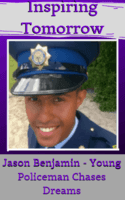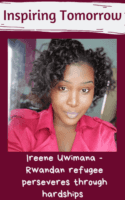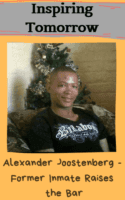A neighbour saw little Andisiwe Dyantyi’s moves and encouraged her to try out for dance classes. Since then nothing – not even a bizarre case of identity theft – has stopped this talented Cape Town youngster from following her dreams.
“I started dancing in primary school at about eight years old. Dance was one of my subjects at that time, but we did it occasionally though. My neighbour saw my passion for dance and she wanted to introduce me to ballet but I ignorantly asked, ‘Isn’t ballet that white people thing?’” Later she found out ballet was colour-blind – everyone could participate.
“She took me to this place where there was a dance group. I heard a drum as we approached and I just saw myself tapping to the rhythm. I didn’t waste time when we finally got there; I just took off my shoes and danced away. I was placed in the front ever since. I got a warm welcome from Dance for All (DFA) and got introduced to ballet. The rest is history,” she says.
Today twenty-one-year-old Andiswe is happy as an assistant dance teacher and choreographer at Dance for All. However she remembers the bitter disappointment of identity theft stripping her of the opportunity to perform with DFA at the 2012 Summer Olympics in London, at only eighteen years old.
“I was in Grade 11 when I went to apply for my identity document so I could do my passport. To my surprise, I found out my ID was already issued to someone else who had the ‘same’ particulars. Home Affairs moved me back and forth and I was told the issue could be resolved in eight months but I had only so much time. My dance group left for London in July and that’s how I missed out on the opportunity,” she recalls sadly.
Andisiwe’s whole world came crashing down as she watched her peers fly overseas. “I used to cry every day. I felt lonely because most of those dancers who were in London are my friends, so there was nobody to hang out with the whole month. But I must say that my DFA family was supportive. They’d say, ‘You are not going to throw your life away because you didn’t go overseas. Those dancers will come back before you know it and you guys will be together again’,” she recalls.
As if seeing her dreams fade away wasn’t a terrible sight enough, she had to deal with her brother’s life taken too soon.
“In June 2012, just before the Olympics, my brother was brutally murdered by someone who happens to be our cousin. The details of that incident are still sketchy to this day,” she explains.
It wasn’t her dance career only that got derailed by these events; Andisiwe’s education also took a knock.
“I [was supposed to do] my matric in 2013. I studied hard the entire year only to find out I wouldn’t be able to write my exams with no ID. It got too much to bear and circumstances forced me to drop out. But eventually I asked myself, ‘Why would I come this far only to give up now?’. And so I continued with my matric,” she says.
She had the motivation and courage to move on with her studies but the ID problem was not resolved – the only thing that stood between her and her dreams.
“My problems just piled up and it got too much to take in, such that I failed my matric. DFA people were really helpful in pushing for my ID. They would tell me to, ‘Soldier on because the one who falls and gets up again is much stronger than the one who never falls at all’. They wrote to Home Affairs and submitted the proof that I was doing my matric and that’s when I could go rewrite my matric rewrite, and I passed eventually.”
Ironically, her finally getting the ID brought more frustration. “My date of birth had entirely changed when it finally arrived! I was now a year older in it, and that got the better of me. It’d make sense if I had lost my birth certificate but I always had it in my possession. I still have more questions than answers,” says the perplexed dancer.
Andisiwe now lives on the edge whenever her ID is a legal requirement: one wrong step or just bad luck could take her back to square one. “My ID must always have this small note that clarifies everything about it. People always want to know why my ID and birth certificate details don’t correspond, so the note provides clarification. If I burnt or lost that note then my life would to come to an end. I’m living my life like a criminal while the culprit lives his freely under my name,” she says angrily.
In the face of all these issues, dance is much more than just a hobby to Andisiwe. It helps her keep her head up confidently and walk tall on her toes – like she’s doing ballet. It also helps her cope with the violence around us. “You don’t necessarily have to be a part of a gang to get attacked. You can get attacked just for being in a wrong place at a wrong time but dance helps me escape all that. Attending practice means you forget about the outside world and its problems. You focus on your dance. You come back in the evening, take a bath and sleep. You don’t have time for any other things but your dance.”
She adds that she goes crazy when it’s holidays because then she can’t go and practise. But holidays don’t mean no dance: she still offers her time and skills
“I try to help whenever I can by teaching traditional dance and ballet to the kids in my township. I want to reach heights that DFA teachers haven’t been able to reach yet. There’s a lot people of who want to dance in our communities but they don’t have access to dance classes. So, I want to use my talent to make their dream a reality.”
As someone who works with children, she says dance teaching is for someone who’s not too lazy to begin with baby steps. “You must be patient and approachable. Leave your frustrations at home. I’m able to tell people where to improve without offending them. Children easily get bored so you must infuse your lessons with a bit of sense of humour. Children can be playful therefore you must be patient and kind to them.”
She manages to control the children in her classes, but it’s a struggle to educate her community members about dance.
“I do get sexual comments from people when I’m doing my dance moves. They get the wrong impression when you’re stretching your leg up – as if you’re trying to seduce people – but dance is an art. It’s what we use to express our emotions. Our male dancers are called names because they don’t look at us in a sexual way – but that doesn’t make them gay. It makes them professionals!” she exclaims.
Andisiwe says not even her family obstacles will get in her way.
“My sister is unable to work because of sickness but I’m working so hard to ensure that I take my family to where I want to see it. I don’t want to fill my mind with negativity because that’s what drives girls to unwanted pregnancy and drugs.”
Her single and unemployed mother remains her source of inspiration.
“My mother taught me to fight until the end. She used to tell me, ‘Don’t stop when you’re tired. Stop when you’re done’. I’ll show my gratitude to my family. Maybe not today, but one day,” she concludes.







